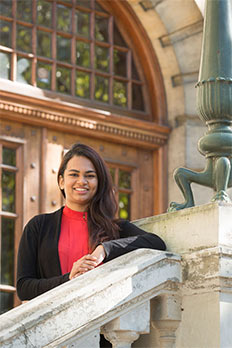 "Where the love of man is, there is also the love of healing" – Hippocrates. Carved into stone above the entrance to the University of Otago's Pathology Department, this quote from the 'father of medicine' speaks to Aarthi Rajesh in more ways than one.
"Where the love of man is, there is also the love of healing" – Hippocrates. Carved into stone above the entrance to the University of Otago's Pathology Department, this quote from the 'father of medicine' speaks to Aarthi Rajesh in more ways than one.
For one thing, the Genetics Honours graduate passes by those words each morning on her way to research the actual healing of wounds - work that she loves.
But she also has an obvious love of humanity, which shines through when asked about her experiences at the University of Otago. 'Best of all have been the people. It's almost like home now.' That is really saying something given that Aarthi is from the state of Kedah in the green humidity of Malaysia, a long way from the cooler climes and grey stone of Dunedin.
Pursuing a path of healing
Kedah is where Aarthi first developed her interest in genetics. She recalls, as a nine year-old, being impressed by a woman who saved the world from a virus - in a movie of course. 'I've since learned the movie was scientifically impossible!' she hastens to clarify. But there is no need to clarify, as she is probably already better qualified to handle a bio-science crisis than her long-ago heroine.
More to the point, it was Aarthi's undergraduate genetics degree at Otago that set her happily on her way through the pathology lab doors each morning. She 'never gets bored of the lab' and feels genetics is what she should be doing. 'I love medical and development genetics and hope to continue research for as long as I can. Perhaps I'll teach or pursue an academic path.'
Aarthi is already well on her way, having completed an honours degree in 2016, and commenced her PhD, while investigating the genetics behind one of the engines of wound healing - Langerhans cells.
Langerhans cells were recently discovered to have a role in wound healing and now Aarthi is exploring what genes and pathways are involved in putting them to work. Her honours thesis explored 'day 1' of the healing process, and her PhD will explore the 'next 15 days.'
Some would call 1 to 15 an appropriate time-ratio between an honours degree and PhD – only half jokingly. But Aarthi credits her honours research with preparing her very well for the step up to higher level research.
'Undergraduate lab work usually gives you predictable results, but postgraduate work takes you into the unknown. some things work, somethings don't – it teaches patience.'
Cutting edge skills
Her year of honours research gave Aarthi many useful skills, she adds, especially in bioinformatics and RNA sequencing.
'I picked up great skills that were new and on the rise, and which took self-learning as well.'
Of course, the other way her honours year prepared Aarthi for a PhD was by teaching her how to 'do a lot of stuff in a short time'.
But again it was the people that made the difference and gave her the confidence and capability to manage the workload of a PhD. 'At first it was intimidating to be surrounded by so many accomplished people. But my supervisor, Associate Professor Merilyn Hibma, made me feel at home, guiding me on the science and non-science aspects of postgraduate life.'
Aarthi's honours year also led to the opportunity of a Summer Internship with Professor Sally McCormick at the Biochemistry Department. Over Dunedin's long summer, Aarthi joined the search for genes to target with potential new drugs that would promote good cholesterol.
'The skills from my honours degree were very transferable and made it easier to start my summer internship project, especially the bioinformatics.'
Aarthi also gained the opportunity of finishing a research paper for publication, adding to three papers to which she contributed in her honours year.
But again, for Aarthi, the value of the internship experience goes back to the people. She describes her internship supervisor Sally McCormick as 'amazing and cool and encouraging, even if you make a mistake.'
Both of her supervisors motivated Aarthi to pursue PhD. 'They gave me assurance and made feel capable of pursuing my PhD.” One could even say that where there is love and support, there is also the love of learning, especially at the University of Otago.






